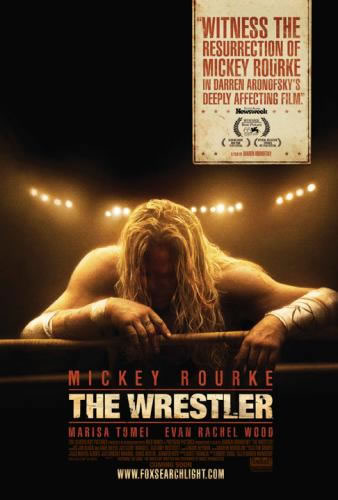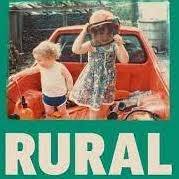 The first glimpse we have of Mickey Rourke in The Wrestler is slouched, with his back to us, in a children's nursery. There are brightly coloured playthings strewn over the floor, and it is never quite clear what he is doing there. That's fine, though, because we're being presented with all of the film's psychological luggage in one shot. The problem is, I could never make up my mind as to whether that was laudable economy, or quick-fix simplification. Rourke plays Randy "The Ram" Robinson, an ageing wrestler who fights and attends nostalgia conventions at the weekends, while working in the back (and later the front) of a supermarket in the week. He briefly gives up wrestling and tries to woo a stripper, Cassidy. Marisa Tomei portrays her with élan, though you wonder to what extent she appreciates the significance of her character; a little re-editing and the film could just as well be called The Stripper, but Tomei's performance is confidently understated - a consummate supporting actress. Randy's daughter is played, a little less convincingly, by Evan Rachel Wood.
The first glimpse we have of Mickey Rourke in The Wrestler is slouched, with his back to us, in a children's nursery. There are brightly coloured playthings strewn over the floor, and it is never quite clear what he is doing there. That's fine, though, because we're being presented with all of the film's psychological luggage in one shot. The problem is, I could never make up my mind as to whether that was laudable economy, or quick-fix simplification. Rourke plays Randy "The Ram" Robinson, an ageing wrestler who fights and attends nostalgia conventions at the weekends, while working in the back (and later the front) of a supermarket in the week. He briefly gives up wrestling and tries to woo a stripper, Cassidy. Marisa Tomei portrays her with élan, though you wonder to what extent she appreciates the significance of her character; a little re-editing and the film could just as well be called The Stripper, but Tomei's performance is confidently understated - a consummate supporting actress. Randy's daughter is played, a little less convincingly, by Evan Rachel Wood.
Rourke's wrestler is a strangely alluring mixture of sleazy theatricality and childlike innocence. For every scene of him berating the stripper who won't live with him, there's another of him tenderly putting on his glasses (they perch, comically, on the rocky contours of his enormous face) or playing Nintendo with a neighbourhood kid. He is obsessed with action figures of himself, and the little pixellated Randy "The Ram" in his own '80s video game. The director, Darren Aronofsky, manages to mix the faintly comic with the unsettling, without coming down too hard on either side. But while this feels like an admirable stylistic achievement, it's another compromise. It's never clear quite what kind of a character Randy is, and thus the film settles for observing him from a distance. For most of the opening we follow the wrestler around from behind, like fans desperate to see his face. Interesting, stylish, yes. But we're still being held at arm's length. Later, when he's walking round the back of a supermarket toward his post at the deli counter, the camera reassumes this position, dogging him as if following him into the ring. For a moment, it's a nice, tacit acknowledgement of the colliding segments of his life. But then the roar of the crowd comes over the soundtrack, painfully driving home the point - Aronofsky is being a little too clever (not surprising, considering his previous work) and, somehow, cleverness doesn't feel like a comfortable fit in a movie about wrestling. The inevitable comparison with Raging Bull, therefore, is destined to deflate. While both films are different in their approach, both share a key ingredient: a director trying to get arty about something that is, essentially, very, very dumb.
Where The Wrestler trumps Raging Bull is structure, which masterfully begins with Randy in a state of reasonable success, shows his life in the gutter, and ends with him in much the same position - adored by loving fans, and hated by his daughter - in the end as the beginning. It is muddled, and doesn't follow a rise to (or even a fall from) glory. To this extent, it admirably apes real life. Though, perhaps that's not a great victory; for a biopic, Raging Bull plays out remarkably like a fable. You'd be forgiven for thinking that The Wrestler was the one "based on a true story".
This is the problem. Does The Wrestler want to be docudrama? Or does it want to be fable? Every time it seems to make a judgement, it pulls back and shows Randy cheerfully serving customers behind a deli counter, and suddenly he seems much more like a teddy bear than he should. Is he a violent sex fiend? Or a misunderstood dad? Is Aronofsky's direction brilliantly spontaneous - as he would have us believe? Or is it just too clever? Ultimately, The Wrestler is a lot like the sport that it portrays: flashy, exciting and with a propensity to make the viewer flinch, but pre-planned enough to the extent that it feels a little too good to be true.

